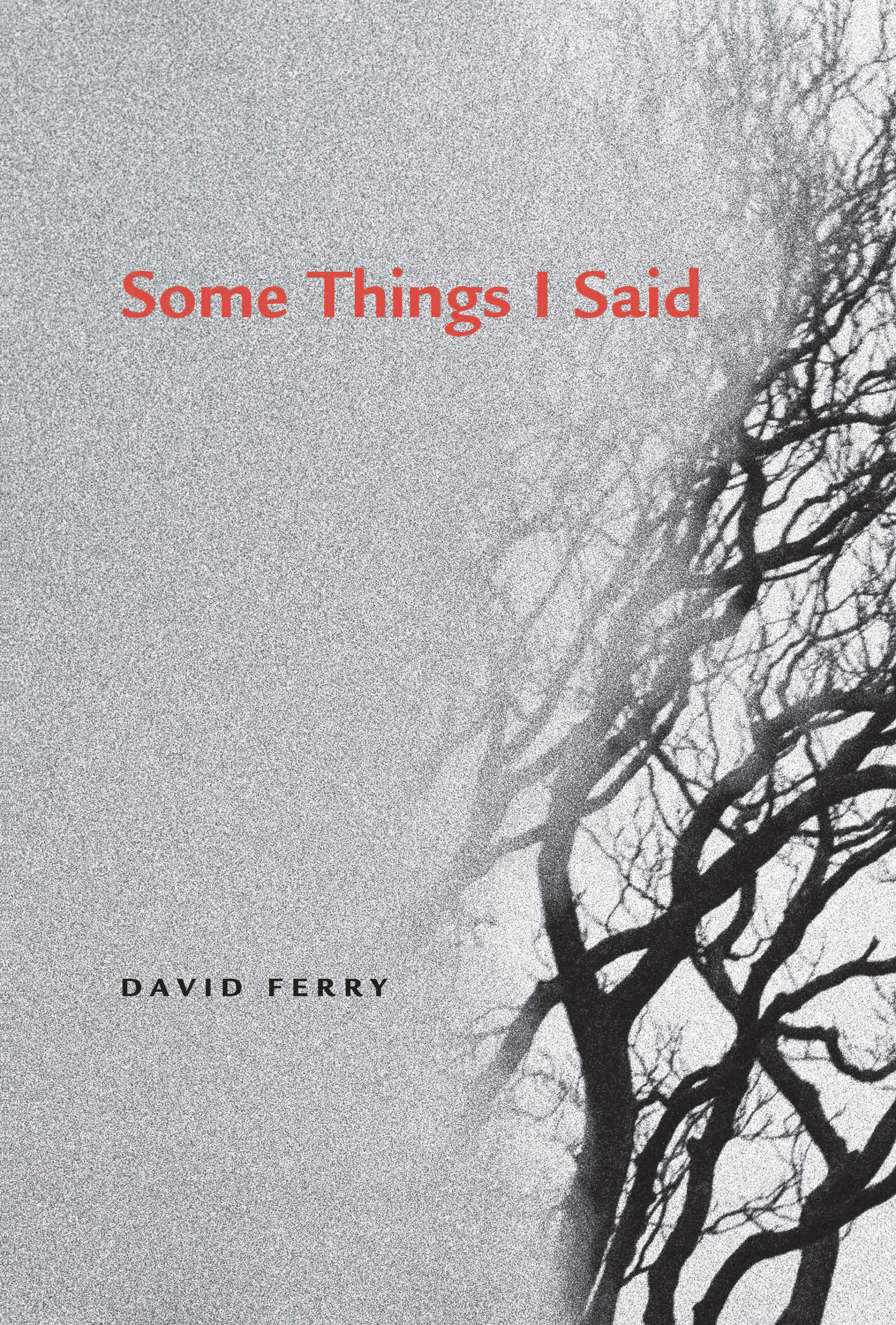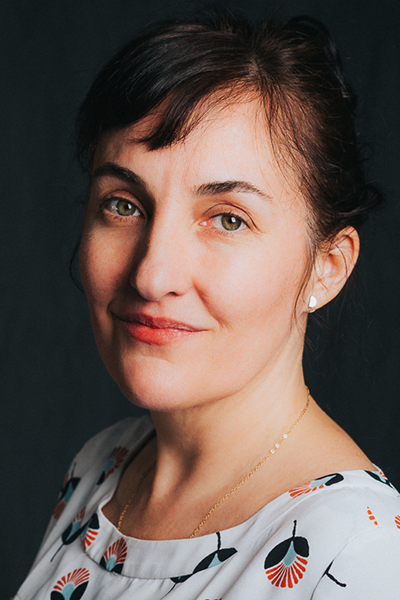In “Some Things I Said,” David Ferry gathers lines from poems he has written, translated, and read into a unique anthology-poem, a poem of uncanny force. In this synthesis of lines from works across his considerable poetic life, Ferry lays bare the expression of a wide range of human experience, from love and awe to loss, bewilderment, and death, through questions—“I said where are you now”—, observations—“I said the boats on the river are taking it easy”—, and enigmatic instructions—“I said better not know too much too soon all about it.”
Ferry’s poems and translations are formally various, subtle and observant, playful and devastating, and always made of music tuned to the matter. His first book of poems, On the Way to the Island, was published in 1960, and his penultimate collection, Bewilderment (2012), won the National Book Award. In the 1990s, Ferry began publishing critically acclaimed works of translation, notable for his inimitable metrical elegance. First, he published a rendering of Gilgamesh (1992), followed by translations, from Latin, of Horace, including The Epistles of Horace (2002), for which he won a Harold Morton Landon Translation Award. He also translated, over the course of twenty years, Virgil’s Odes (2000) and Georgics (2005) and, finally, The Aeneid (2017).
I first discovered David Ferry’s poetry when I heard him read, with Seamus Heaney at Boston University. I overheard him discussing Virgil’s Georgics with Heaney, talking and laughing over their shared texts and memories. Later, Ferry read his translation, from Anglo Saxon, of the story of Abraham and Isaac, a text he described as “hair raising” and read with astonishing frankness and power. In this reading, I heard “some things” Ferry “said,” or read, in his own voice, and I felt that voice work to communicate what Ferry felt in these texts, from the chilling ancient story to his ars poetica “Of Rhyme,” a poem, he noted, about how poems “that are fully alive find out what they are, line after line, their forms shaping themselves into identity.”
I was immediately enthralled with Ferry’s work, the clarity of his observations and the fluid iambic music for which he is known. Ferry’s œuvre is also distinguished by a deep intertextuality, especially evident in Of No Country I Know and Bewilderment, his major collections of the past twenty years. These robust volumes of Ferry’s poetry also include his translations and “renderings” of poems by Rilke, Hölderlin, Goethe, Catullus, Montale, Baudelaire, as well as work by poets he is celebrated for translating, including Virgil, all brought into conversation around Ferry’s ongoing considerations: the struggle to find shelter, to reconcile with the natural world and our own place in it, and our ever-present consciousness of our mortality, heightened by the loss of our loved ones.
As David Ferry’s wife, Anne Davidson Ferry, wrote in her critical volume about anthologies, Tradition and the Individual Poem, “The anthologist as the author of the book supplants the author of the poem in choosing how it should be presented, with interpretive consequences […].” In addition to the layering of his single-authored poems, translations, and adaptations, Ferry includes, in both aforementioned books, poems responding to those of his longtime Wellesley colleague, poet Arthur Gold. In these pairings, Gold’s poems are printed in italics, followed by Ferry’s responses, poems that meld an intimate address to Gold with critical analysis and highly lyric and personal turns. Thus, Ferry invents a new kind of poetic form, one related to the practice of translation—made through a similar close, collaborative, and embodied reading—which, in this case, in speaking back to the source, is free to include the reverie that naturally accompanies reading.
In “Some Things I Said,” Ferry turns this reading practice to his own work: both his poems and his translations—and even the work of Wallace Stevens, the one other poet whose original English-language work is included in the poem—, and draws forth a new poem, an assemblage of fragments, a portmanteau, found lines sometimes presented almost as they were in the original and sometimes much-altered. While Ferry’s placement of poems by various authors on consecutive pages in Bewilderment (and other volumes)—most poignant in the case of poems about the loss of Ferry’s wife presented beside Aeneas’s search for his own lost wife—creates a powerful resonance, in “Some Things I Said,” he brings the lines into even closer relation. Together on the same page, lines whisper in chorus but are ultimately spoken by a single voice.
The repetition of “I said” in the poem pushes toward a unified speaker, a coherent “I,” the consciousness that assembled them into one poem, and thus the division between Ferry-as-writer and -translator, or even -reader, dissolves. Ferry himself said, in an interview with poet Tess Taylor: “I’m not very clear that ‘translator’ and ‘poet’ are separate categories. In both activities, my continuous experience is the experience of writing lines, trying to make those lines work as well as they can[. . .].” The anaphoric “I said” is also, as the first line, or subtitle, of the poem suggests, “writing on the wall,” inscribing elemental messages that cut across time, messages which can be bewilderingly open-ended, as in the stanza:
- I said revenant whitefaced Death is walking not knowing whether
and other times, as in the final lines of the poem, vulnerable, speaking alone, and also, paradoxically, silent:
- I cried in my mute heart,What is my name and nature
David Ferry’s names, the Biblical David, meaning “beloved,” and Ferry, do seem to connect to his poetic nature. The word “translate” derives from the Latin for “ferry across,” and so his identity as a translator certainly connects to his name, but also, Ferry’s poems, including “On the Way to the Island” and “Down by the River,” frequently involve rivers, watercraft, and water crossings. In one of the poems referenced in “Some Things I Said,” “That Now Are Wild and Do Not Remember,” written for Ferry’s wife, Anne, Ferry laments her absence, even as she’s still physically present in “the wilderness there elsewhere in the bed,” and envisions her “Restlessly wandering, along the shore, / Waiting for a way to cross the river.” These figurations of shores, both actual and archetypal, persist throughout the source poems of “Some Things I Said,” at times in lighthearted ways, but it’s Ferry’s “I” that guides us to the edge of the underworld and back.
The things of the poem’s title are words: sounds, acts spoken into existence, wishes, desires, and goodbyes. Having first appeared in print in 2019, the poem “Some Things I Said” has now spoken into existence a book-length anthology of the same title, published just a month after Ferry’s death, in 2023, at age ninety-nine. In this beautifully-made book, the title poem is followed by each of its source poems, and, as a prism breaks light into its component colors, so the book reveals the variety of tones and forms in the constituent poems of “Some Things I Said,” as poems spanning Ferry’s career are placed beside brief excerpts from his Gilgamesh and his Horace and Virgil.
Some Things I Said is edited by Ferry’s children, scholar Elizabeth Ferry and photographer Stephen Ferry, who contributed photographs, and poet George Kalogeris, who wrote the afterword for the book. This volume unfolds what has been compressed into the title poem, and, in doing so, connects to another, concentrically unspooling set of poetic connections and offers much to consider about the mysterious fluidities, and differences, between reading, writing, translating, rewriting, and, of course, speech.
Dan Chiasson writes, in the introduction: “Here is an entirely unique book, the only one of its kind that I know to exist: an anthology of the works excerpted and brilliantly transformed into the single weave of one of David Ferry’s most beautiful poems. . .” Chiasson notes that the poem, and thus the book, is “first an elegy for Anne Ferry, whose brilliant scholarship helps us read and understand” the work. Indeed, a photograph of Anne Ferry is printed at the center point in the book, while photographs of David Ferry open and close the volume: first, appropriately, reading (speaking) outside of the Grolier Poetry Book Shop, whose press published Some Things I Said, and, finally, an image of Ferry walking away from the camera, cane in hand, a shadow stretching behind him and toward the viewer. It’s hard not to read this image in relation to Ferry’s figuration of death through a Classical lens, as gesturing to his own departure and river crossing.
Perhaps to call this work final is to do it an injustice, because, in Ferry’s literary enterprise, he has in key ways transcended time, making ancient texts present, pushing against the boundaries of mortality, the wall between the living and the dead, with humanity, with longing and will. In this singular poem, he assembles words and voices from across millennia to create something wholly new.




